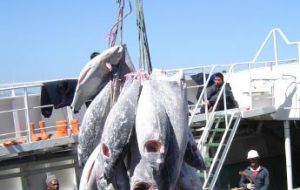MercoPress. South Atlantic News Agency
Quotas for Atlantic blue fin tuna cut by one third to 13.500 tons
 Conservation groups warn about (extended) under-reporting and illegal fishing
Conservation groups warn about (extended) under-reporting and illegal fishing The body responsible for managing Atlantic blue fin tuna has decided not to suspend the fishery in response to concerns over dwindling stocks. The International Commission for the Conservation of Atlantic Tunas (Iccat) instead decided to lower the annual catch quota by about one third.
Conservation groups said the decision would encourage illegal fishing. Iccat scientists said recently that blue-fin numbers were at about 15% of pre-industrial-fishing levels.
They also said that drastic limits on fishing now would facilitate the growth of a more profitable industry in years to come, as stocks became more plentiful.
A number of conservation groups attending the Iccat meeting in Recife, Brazil said that delegations - led by the EU - had put short-term commercial concerns before the longer-term interests of both tuna and fishermen.
“Since its inception, the International Commission for the Conservation of Atlantic Tunas has been driven by short-term commercial fishing interests, not the conservation ethic implied by its name,” said Sue Lieberman, director of international policy for the Pew Environment Group.
“Only a zero catch limit could have maximised the chances that Atlantic blue fin tuna could recover to the point where the fishery could exist in the future.”
However, the European Commission - which represents the EU - described the outcome as “strong”.
“It is a clear sign that the international community acknowledges the scale and magnitude of the problem and is ready and willing to work constructively with scientists, environmentalists and the industry to find the best possible compromise that will ensure the sustainable exploitation of this fragile stock and the viability of the industry concerned,” it said in a statement.
The Commission also noted that the option of a moratorium remains on the table “in case new assessments show... there is a serious threat of fishery collapse”.
The new quota allows 13,500 tonnes of blue-fin to be caught next year in the Eastern Atlantic and Mediterranean, down from 19,950 tonnes.
The fishing season will also be shortened by one month for purse seine ships, which use nets to encircle and trap shoals of the lucrative fish, often when they are spawning.
However, the size of the quota is only one of the issues that have seen blue-fin tuna numbers tumble over the last few decades.
Some countries, notably in southern Europe, have simply exceeded their annual quotas, while illegal and unreported catches are estimated to add a further 30% to official numbers. As stocks and quotas decline, vessel owners face the choice between keeping their expensive ships in port or fishing illegally.
“This... will lead to individual vessel quotas that are too low to economically sustain fishing activities,” said Xavier Pastor, executive director of the Madrid-based conservation group Oceana.
“This will definitely encourage under-reporting of catches and illegal fishing.”
Most European governments back a recent proposal from Monaco to restrict trade in bluefin under the Convention on International Trade in Endangered Species (CITES). The proposal will be tabled at the CITES meeting in March.
Last month, Iccat's scientific advisors concluded that the notable decline from the “natural” level - before the era of industrialised fishing - would justify a ban.
But some countries are keen to keep management of commercial fish species within fisheries management organisations such as Iccat.
According to the Singapore-based Straits Times, an un-named Japanese fisheries official welcomed the meeting's outcome, arguing that it would help “control the fish population under Iccat, not anything else”.
The US said it would consider whether to back the CITES bid after reviewing the outcome of this Iccat meeting, which it viewed as the organisation's “last chance” to implement effective management for blue fin.




Top Comments
Disclaimer & comment rulesCommenting for this story is now closed.
If you have a Facebook account, become a fan and comment on our Facebook Page!